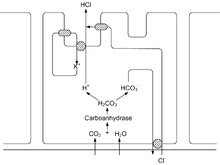Gastric juice
Gastric juice (also Succus gastricus ) or gastric acid is a more or less thick and clear liquid with a strongly acidic reaction. The reaction is caused by the hydrochloric acid ( gastric acid ) contained in gastric juice , which is an important component of gastric juice. However, the hydrochloric acid is in a very dilute form, with a concentration in the pure state between 0.5 and approx. 1.0% free HCl. Pure gastric acid thus shows the typical properties of pure hydrochloric acid of the same concentration in terms of appearance, odor and chemical reactivity.
In addition to hydrochloric acid, gastric juice mainly contains mucus , the protein- splitting enzyme pepsin and the intrinsic factor ( mucoprotein , which is necessary for the absorption of vitamin B 12 in the ileum ). It also contains rennet , which supports protein breakdown and digestion (milk protein coagulation). Stomach acid has a pH close to 1 on an empty stomach and 2 - 4 when it is full. It serves to break down food ( hydrolytic breakdown of proteins into oligopeptides or individual amino acids) and has a bactericidal effect.
The stomach acid is made up of protons and chloride ions . The chloride ions are absorbed through food, and gastric acid is produced in the parietal cells of the gastric mucosa, which are sunk in ducts and tubules. Stimuli for increased secretion of chloride ions include stimulation of the parasympathetic nervous system (can also be triggered optically by the so-called Pavlovian reflex ), histamine and gastrin release .
The epithelial cells of the gastric mucosa prevent the gastric juice from breaking down and digesting cell membranes and thus the stomach itself.
A distinction is generally made between three different phases in gastric secretion:
- Cephale phase ("head phase"): By stimulating the vagus nerve (thinking, seeing and smelling food)
- Gastric phase (" stomach phase "): Due to expansion of the stomach and chemical irritation from proteins, spices, etc.
- Intestinal phase (" intestinal phase "): Through hormonal blocking of the formation of gastric acid (when the chyme has reached the duodenum )
If the stomach acid flows into the esophagus (reflux), this is noticeable as heartburn . Frequent reflux leads to metaplasia of the epithelium of the esophagus, which can promote the development of esophageal cancer .
The pure gastric juice can be used as reflux z. B. can be observed in people with a PEJ probe (percutaneous endoscopic jejunostomy ).
secretion
The hydrochloric acid as stomach acid is composed only extracellularly to protect the stomach epithelium. The parietal cells only secrete chloride ions, which requires a complex and energy-intensive process. In a multi-stage process, oxonium ions are generated and introduced on the one hand , and chloride ions from the blood plasma are exchanged in a second process. In detail the steps are:
- By carbonic anhydrase catalyzed formation of H + ions in the cells. The parietal cells of the gastric mucosa produce protons (H + ) and hydrogen carbonate (HCO 3 - ) from water (H 2 O) and carbon dioxide (CO 2 ) .
- CO 2 + H 2 O → HCO 3 - + H +
- Exchange of H + for K + by means of a proton potassium pump (see there).
- Exchange of the HCO 3 formed - by Cl - from the blood plasma.
- Recirculation of K + and simultaneous release of Cl - into the stomach by means of passive transport mechanisms.
Web links
- Gastric juice in the lexicon of nutrition spectrum of science

